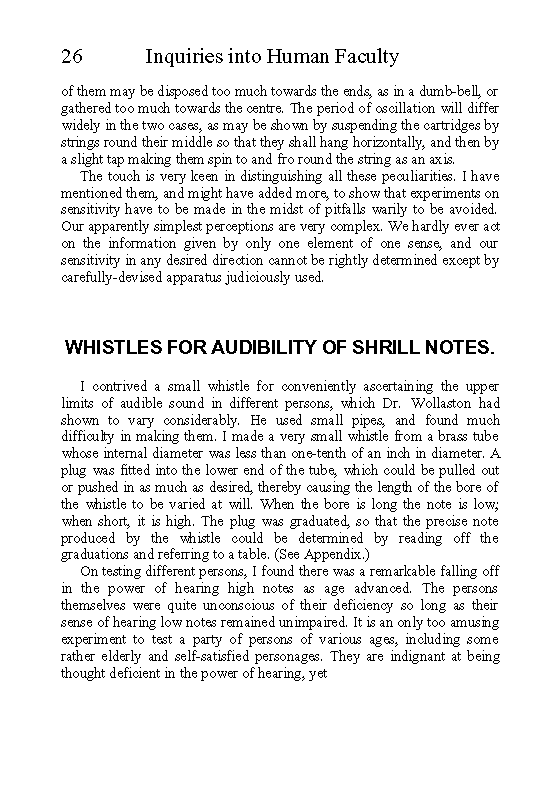26 Inquiries into Human Faculty
of them may be disposed too much towards the ends, as in a dumb-bell, or gathered too much towards the centre. The period of oscillation will differ widely in the two cases, as may be shown by suspending the cartridges by strings round their middle so that they shall hang horizontally, and then by a slight tap making them spin to and fro round the string as an axis.
The touch is very keen in distinguishing all these peculiarities. I have mentioned them, and might have added more, to show that experiments on sensitivity have to be made in the midst of pitfalls warily to be avoided. Our apparently simplest perceptions are very complex. We hardly ever act on the information given by only one element of one sense, and our sensitivity in any desired direction cannot be rightly determined except by carefully-devised apparatus judiciously used.
WHISTLES FOR AUDIBILITY OF SHRILL NOTES.
I contrived a small whistle for conveniently ascertaining the upper limits of audible sound in different persons, which Dr. Wollaston had shown to vary considerably. He used small pipes, and found much difficulty in making them. I made a very small whistle from a brass tube whose internal diameter was less than one-tenth of an inch in diameter. A plug was fitted into the lower end of the tube, which could be pulled out or pushed in as much as desired, thereby causing the length of the bore of the whistle to be varied at will. When the bore is long the note is low; when short, it is high. The plug was graduated, so that the precise note produced by the whistle could be determined by reading off the graduations and referring to a table. (See Appendix.)
On testing different persons, I found there was a remarkable falling off in the power of hearing high notes as age advanced. The persons themselves were quite unconscious of their deficiency so long as their sense of hearing low notes remained unimpaired. It is an only too amusing experiment to test a party of persons of various ages, including some rather elderly and self-satisfied personages. They are indignant at being thought deficient in the power of hearing, yet

